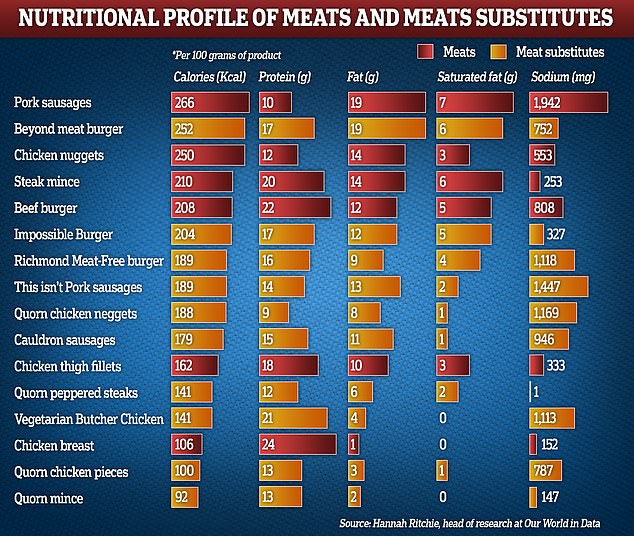The Complexities of Vegan Diets and Men's Health: Unpacking the Evidence
Dec 30, 2024Explore the complexities of vegan diets and men's health, examining the risks of unhealthy plant-based foods and the benefits of balanced vegan nutrition.
The Complexities of Vegan Diets and Men's Health: Unpacking the Evidence
Recent research has sparked debate around the health impacts of vegan diets, particularly for men. While plant-based eating is often lauded for its benefits, emerging data suggests that not all vegan diets are created equal. This article delves into the nuances, exploring how specific dietary choices within a vegan framework might contribute to outcomes such as frailty and increased mortality risk, especially among men. We will explore the importance of balanced nutrition and address the concerns raised by the statement: Vegan men frail, die young, British data suggests - with unhealthy plant-based foods to blame, which has emerged from the latest studies.
The Shifting Landscape of Veganism: A Generational Divide
Attitudes towards veganism are evolving, with a clear generational divide emerging. Younger generations, particularly millennials, are increasingly embracing plant-based diets for ethical, environmental, and perceived health reasons. They often view veganism as "trendy" and "eco-conscious." However, older generations tend to be more skeptical, often seeing it as a passing fad or questioning its long-term health benefits. This divergence highlights the need for a more nuanced understanding of veganism and its impact on health, beyond simply labeling it as a “healthy” or “unhealthy” choice.
Understanding the Potential Pitfalls of Unhealthy Plant-Based Diets
While plant-based diets can offer numerous health benefits, they are not inherently healthy. A recent analysis of British data has linked a higher intake of unhealthy plant-based foods to an increased risk of frailty, particularly among men with lower incomes. This study identified that those who frequently ate vegan desserts, white bread, and roasted potatoes were more likely to experience frailty in middle age, a predictor of premature death.
 Credit: whatsnew2day.com
Credit: whatsnew2day.com
These findings underscore the importance of diet quality within any dietary pattern, including veganism. The study found that every 10-point increase in a score based on unhealthy plant-based foods was linked to a 7.7 percent increase in frailty. This figure rose to 18 percent for low-income men. This indicates that the source of plant-based foods is just as important as simply adopting a plant-based diet.
The Importance of a Balanced Vegan Diet
The key takeaway from this research is that a balanced vegan diet is crucial. A diet relying heavily on processed plant-based foods, high in refined carbohydrates and added sugars, may not offer the same protective benefits as one rich in whole, unprocessed foods. This includes fresh fruits and vegetables, whole grains, legumes, nuts, and seeds.
A balanced vegan diet should:
- Include at least 5 portions of a variety of fruits and vegetables daily.
- Base meals on whole-grain starchy carbohydrates like potatoes, bread, rice, and pasta.
- Incorporate fortified dairy alternatives, such as soya drinks and yogurts, choosing lower-fat and lower-sugar options.
- Include a variety of beans, pulses, and other plant-based proteins.
- Ensure daily intake of nuts and seeds rich in omega-3 fatty acids, such as walnuts, flaxseeds, and chia seeds.
- Use unsaturated oils and spreads sparingly.
- Include fortified foods or supplements containing nutrients that are more difficult to obtain through a vegan diet, including vitamin D, vitamin B12, iodine, selenium, calcium, and iron.
- Drink plenty of fluids, aiming for 6 to 8 cups or glasses a day.
Addressing Specific Nutrient Concerns for Vegan Men
The study also highlights the importance of specific nutrients often associated with animal products, such as calcium, iron, vitamin B12, iodine, and selenium. Vegan men need to be particularly aware of how to obtain these nutrients from plant sources or through fortified foods and supplements. A lack of these nutrients can lead to deficiencies that may contribute to health problems, including frailty.
Calcium and Vitamin D
Calcium is crucial for bone and teeth health. Vegans can obtain calcium from:
- Green, leafy vegetables such as broccoli, cabbage, and okra (though not spinach).
- Fortified unsweetened soya, pea, and oat drinks.
- Calcium-set tofu.
- Sesame seeds and tahini.
- Pulses.
- Fortified breads and dried fruits.
Vitamin D, which is necessary for calcium absorption, can be obtained through:
- Sunlight exposure.
- Fortified plant-based products.
- Vitamin D supplements, especially during autumn and winter.
Iron
Iron is needed for red blood cell production. Vegan sources of iron include:
- Pulses.
- Wholemeal bread and flour.
- Iron-fortified breakfast cereals.
- Dark green leafy vegetables.
- Nuts.
- Dried fruits.
Vitamin B12
Vitamin B12 is essential for a healthy nervous system and blood. Vegans must obtain it from:
- Vitamin B12 fortified breakfast cereals and unsweetened soya drinks.
- Fortified yeast extracts, such as Marmite, or nutritional yeast flakes.
- Supplements.
Omega-3 Fatty Acids
Omega-3 fatty acids are crucial for heart health. Plant-based sources include:
- Ground linseed (flaxseed) oil.
- Vegetable (rapeseed) oil.
- Chia seeds.
- Shelled hemp seeds.
- Walnuts.
Examining the Impact of Plant-Based Meat Alternatives
The increasing popularity of plant-based meat alternatives (PBMAs) raises questions about their nutritional value. Some studies have found that PBMAs, while offering a plant-based option, may contain high levels of salt and saturated fat, and lack the beneficial nutrients found in whole plant foods. While PBMAs can be useful for those transitioning to a plant-based diet, they should not be relied upon as the primary source of nutrition.
 Credit: whatsnew2day.com
Credit: whatsnew2day.com
The Potential Benefits of Plant-Based Diets When Properly Implemented
Despite the potential pitfalls, research also suggests that well-planned plant-based diets can offer significant health advantages. Studies have linked healthy plant-based dietary patterns to a lower risk of various diseases. These diets are often rich in fiber, vitamins, minerals, and antioxidants, which can promote heart health, reduce inflammation, and support overall well-being. These findings emphasize the importance of a focus on whole, unprocessed plant foods to obtain the full benefits of a plant-based diet.
New Research into Epigenetic Changes and Plant-Based Diets
Emerging research is now exploring the epigenetic impact of vegan and omnivorous diets. One study found that a short-term vegan diet can be associated with epigenetic age benefits and reduced calorie intake. Epigenetic clocks, which measure biological age, showed a decrease in the vegan cohort, suggesting potential anti-aging effects. This research further emphasizes the potential of vegan diets, when carefully planned, to promote health.
Conclusion: A Nuanced Approach to Plant-Based Eating
The statement that Vegan men frail, die young, British data suggests - with unhealthy plant-based foods to blame highlights a critical need for a nuanced approach to plant-based eating. While plant-based diets can be incredibly beneficial, they require careful planning to ensure adequate intake of all essential nutrients. A diet focused on whole, unprocessed plant foods and appropriate supplementation can help people, especially men, achieve optimal health and longevity. The key is to avoid the pitfalls of relying on processed vegan options and to prioritize a diverse and balanced nutritional approach. Further research into the long-term impacts of different types of plant-based diets is essential, but these initial studies provide evidence that the quality of a vegan diet is key to success.
Jan 21, 2025
Explore the pros and cons of a plant-based diet, including health benefits, potential challenges, and tips for successful implementation. Learn about vegetarian, vegan, and flexitarian approaches.
Jan 20, 2025
Explore the latest research on plant-based diets and their powerful health benefits, including disease prevention, heart health, diabetes management, and cancer risk reduction.
Jan 16, 2025
Explore the nutritional landscape of processed fake meat, comparing them to traditional meat and whole plant foods. Learn about ingredients, health impacts, and making informed choices.